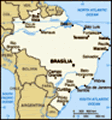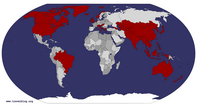Advertisement
Published: March 22nd 2014
Tuesday – Mar. 18/14, Parintins
Today’s port-of-call was Parintins which is situated halfway between Santarem and Manaus. This quiet 200-year old town of 100,000 is located on Tupinambarana Island, which in colonial times served as a resting station for indigenous Brazilians who travelled upstream from the coast to avoid becoming slaves to the Portuguese.
Today Parintins is the site of the Boi-Bumba, one of Brazil’s important festivals, which is celebrated annually in June. During its three day run there is a mixture of theater, drums, dancing, music, etc. The festival involves a parade of human and animal characters, and fanciful creatures from Brazilian Indian mythology, and celebrates a 19
th century fable about a resurrected ox. Two teams, the Garantido and the Caprichoso re-enact the kidnapping, death and resurrection of an ox, which is the metaphor for the annual agricultural cycle. Each team retells the story, attempting to outdo the other, with flamboyant dances, dazzling costumes, singing, and intricate parade floats. The whole exercise is accompanied by rhythmic Boi-Bumba music continuously playing throughout the parades. Originally the
parade was held on the open streets but now is held in a 35,000 person capacity stadium, which attracts an audience of thousands of local and visiting participants. Some individuals who have studied the Boi-Bumba feel that this festival, because of its more inclusive participative nature rivals Rio’s Carnaval in its glamour.
We went ashore for a special afternoon presentation of the Boi-Bumba, which was held in the local convention center and not the stadium. The whole exercise started out on the wrong foot. This was a tender port and earlier in the day the shore excursion staff and the deck crew required everyone going ashore to go to the showroom to collect a tender ticket. This way they could control the number of individuals heading to the tenders at any moment. As the morning progressed they suspended this requirement and went to what is referred to as “open tenders”; no ticket required. Therein lies the principle problem. From 12:00 on, when most of the passengers who wanted to go ashore for the 2:00 pm show, people showed up at the tender station and became part of a massive crowd. We had to wait in a very
confined space as tenders coming back from shore first disgorged their passengers, all of whom had to go through security, then we were allowed to board. The trip ashore was pleasant enough and at the dock we had to climb out of the tender onto a waiting riverboat, which was acting as our docking berth. Of course there were individuals who suffered from various forms of mobility concerns, who had been strongly advised not to go ashore, in the queue holding things up.
After a short walk across the riverboat, and an uneven step out of the boat to reach the floating dock which we followed onto the island, we entered the auditorium. As we entered the Shore Excursion staff stuck tour numbers on us so that we would be better organized for the return tenders and avoid the mess we just encountered coming to the performance. There were no seats in the first 4 rows as we found out later that many people had gone ashore earlier and had lined up to claim the choice seats. We did find a spot four rows back and thought we would have a fair view of the festival. The
first ten rows of seats were not on risers; the back six rows were on low risers and were only slightly higher than those in front and there was a platform at the back for photographers to stand on. The problem was those individuals in the first four rows of seats who held their cameras, video recorders and “tablet” style devises out in front of them or high above their heads for their photos blocked the view of those behind them and were totally inconsiderate to their fellow passengers. Brooke asked one of the ship’s officers, who was there, if she could make a suggestion and received a very curt and dismissive reply that HAL could not prevent passengers from taking pictures at the event because they had “paid for their tickets” – to which she could but reply “So did I”. The irony was that onboard ship at the evening performance there was a distinct announcement that no flash photographs or recordings could be done during the performance.
If HAL really wanted to promote this cultural event and make it pleasurable for everyone they should have strongly suggested that if you wanted to take pictures of
the performance that you stand to the side or go to the raised platform in the rear and not block the view of fellow passengers. Maybe it is time that a photographers’ code of conduct, similar to Emily Post’s book of manners, be implemented. At any rate I stood at the back of the auditorium and have some very colourful shots of the performance.
We returned to the ship and shortly thereafter the tenders were raised and we set off for Alter do Chão. The evening dinner required formal attire once again and this evening’s performance was performed by the Cast of the Maasdam and was entitled “Unforgettable” - an enjoyable evening of music as we strolled down memory lane.
Wednesday – Mar. 19/14, Alter do Chão
Our last port-of-call in the mighty Amazon basin was Alter do Chão which is located on the Rio Tapajos at the outlet of the Lago Verde and approximately 33 kilometers west of Santarém. The town gained its name from the two hills just beyond the
town, which resemble a “church altar”. This area is also referred to as the “Caribbean in Brazil” because of the numerous beaches in the vicinity where people from Santarém come for weekend getaways. A sandbar directly in front of the town forms a picturesque white-sand beach, known as Ilha do Amor (Island of Love), and it would have been a desirable stopping point for passengers but unfortunately it was entirely submerged by the rising river and all you could see were the thatched tops of the cabanas. The area also gained some notoriety when Henry Ford tried in the 1920’s and 1930’s to establish two rubber plantations Fordlândia and Belterra to supply rubber for his cars. Due to poor planning, the introduction of rubber from Malaysia to the world market, WW2 and the establishment of synthetic rubber production both project sites failed and the plantations were sold to the Brazilian government in 1945. The jungle is reclaiming Fordlândia while some individuals still inhabit Belterra.
I took part in another eco walk in the rain forest and saw much of the same flora as was seen in other walks. Once again we heard birds but saw none. The
swarms of insects that we had been warned about didn’t materialize either. The day started out with very heavy rains so ponchos were necessary for a good portion of our walk. Actually coming into the pier the rain was so heavy the tender pilot could not see the landing zone and a smaller boat had to come and lead him in. Out in the jungle we heard the rain hitting the leaf canopy over our heads a good two to three minutes before it started to pelt us; giving us just enough time to get our ponchos out of our backpacks and over our heads. While we were in the forest we also heard a great crashing noise, followed by a very heavy thump. Our guides identified the noise as a falling Brazil Nut pod. The pods, which can weigh about 2 kilos each and contain up to 20 individual Brazil nuts, fall from 50 m heights and strike the ground with a force of 50k. Many families go out into the jungle to collect the pods and frequently the falling pods injure individuals. Other than humans the only animal or bird that can crack the pods open are Toucans.
After the tour we were driven back to Alter do Chão where I did some exploring of the town looking for the store Araribá, a store that had been recommended to us for its superb collection indigenous Brazilian art.
Returned to the ship for a late lunch at the “Dive In” burger stand poolside on the Lido. While I was ashore the Captain announced that he was going to ease up on the “code red” status on selected items. He down-graded the “code red” and replaced it with a “code yellow”; the hot tubs and pool were reopened; the Library books were once again available and some of the restrictions on self service in the Lido buffet line were lifted. The Captain still insisted that another 48 hours was needed before he would remove all of the restrictions.
After dinner entertainment was by Davie Howes, another British musician who was accomplished on several brass instruments, the coronet, the post horn, the pocket trumpet and the flugel horn. Just before his performance started the Captain came on the PA system and announced that
we had to turn back to Santarém because of a medical emergency. A passenger had been injured and required hospitalization. It took us over an hour and a half to turn around and approach the city, where we dropped one of our tenders and evacuated the individual, their personal belongings and a translator to assist. Everything was done with a high degree of precision and professionalism – the boat crew should be acknowledged.
Thursday – Mar. 20/14, Last day cruising on the Amazon
Captain is really making up time, as he has to cross the bar before the tide drops when there will only be 3 m under the keel at high tide.
As is fitting for our last full day in the Amazonian basin it has rained off and on all day. We have been travelling in and out of clouds, fog and passing showers.
Now that the “code red” status has been eased the Culinary Hostess Stefaney was able to resume the Cooking Show demos. This morning’s presentation featured
three post Lent treats for us: Rum Balls, Sex in a Pan and Raspberry Meringue Bars. This afternoon Raj prepared Jerk Chicken with Peppa Cream Sauce and Mango Chutney.
Notice in the daily: Possible Satellite Outages – Solar outages happen when the sun appears in the sky behind the satellite that the earth station antenna is pointing towards. The energy from the sun is received by the earth station antenna, and is more powerful than what the satellite is sending, resulting in total loss of signal.
This evening’s performance was a classical pianist Naomi.
Advertisement
Tot: 0.098s; Tpl: 0.014s; cc: 9; qc: 23; dbt: 0.0518s; 1; m:domysql w:travelblog (10.17.0.13); sld: 1;
; mem: 1.1mb














